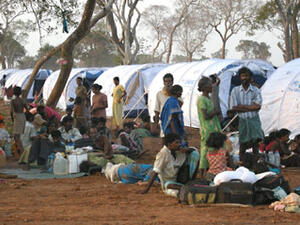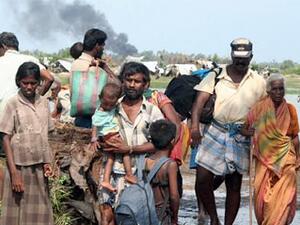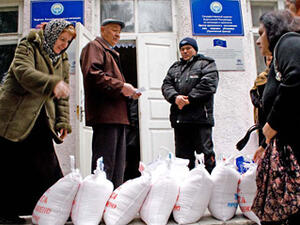Congo returns show where there's a 'whale', there's a way
Congo returns show where there's a 'whale', there's a way
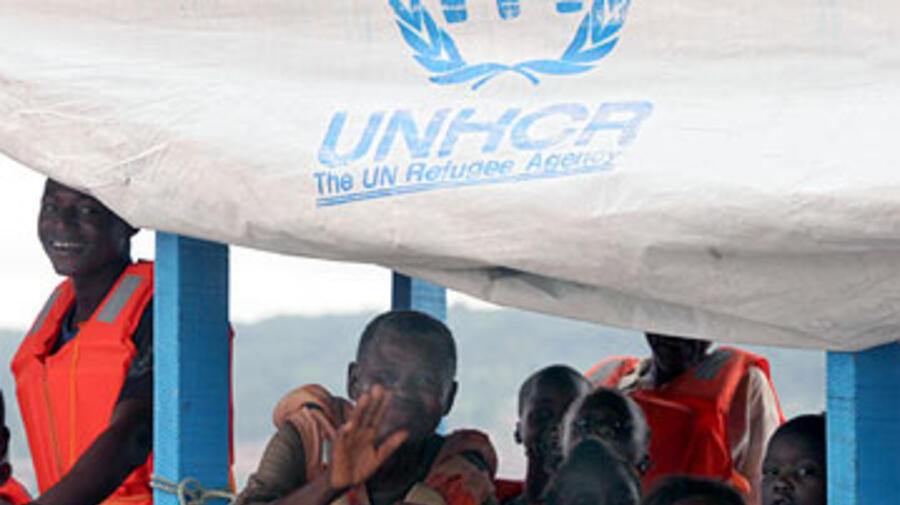
Refugees crossing the Oubangui River in a baleinière taking them home from Republic of the Congo to Democratic Republic of the Congo.
BETOU, Republic of the Congo, July 13 (UNHCR) - It's rainy season in the Congo. The downpours that pelt the dense primaeval jungle for six months of every year swell the Oubangui River, which rushes down from the Central African Republic and feeds into the mighty Congo River.
Unlike other parts of Africa where seasonal rains frequently disrupt UNHCR's efforts to serve refugees, here on the border between the Republic of the Congo (ROC) and the Democratic Republic of the Congo (DRC), the swollen Oubangui has been a godsend, becoming the main route home for thousands of Congolese.
"It's easier because the water level is higher and you can navigate easily on the river," observed Jeannette Zuefle, Associate Protection Officer for the UN refugee agency, as she watched more than 100 refugees board specially-built boats on Tuesday for the trip home after five years in exile.
"In the dry season we had difficulties when we first started this repatriation on April 27," she said. "The water was so low we couldn't navigate even with the small boats. With the big boats it was impossible."
There are some 16,000 refugees from DRC's north-western Equateur province living along the river in ROC whom UNHCR will take home by the end of next year. Tuesday's convoy of 109 men, women and children brought to nearly 1,100 the number who have already gone home since the operation started at the end of April.
It's been one of UNHCR's more logistically-challenging repatriations in the heart of Africa. Logistical problems - starting with the fact that UNHCR had to build boats to carry the refugees - delayed the repatriation by more than half a year after agreement was signed with the two governments for the return of the refugees.
"Even when we found people to build the boats, we had difficulties getting the pilot wheels and motors. Everything was a problem," said Modeste Kouame, head of UNHCR's field office in Betou. Incredibly, in the middle of a forest teeming with massive trees, even getting the strike-plagued local timber company to deliver lumber for the boats on time was a problem.
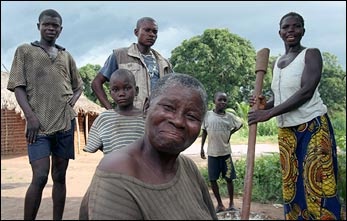
Surrounded by her family members, Henriette Embombalo has just arrived at her home village of Zambi in the DRC.
Now that the boat convoys are taking refugees home twice a week, there is still the challenge of collecting them from the 39 sites where they live scattered along a 160-km stretch of the river. Some live deep in the forests and are hard for UNHCR to reach. (They have supported themselves by fishing, farming and foraging in the jungle since their arrival five years ago. They live intermingled - and in some cases intermarried - with the local population, not segregated in refugee camps as in many other countries.)
As the refugees boarded the oval-shaped wooden boats the locals call baleinières - supposedly because of their resemblance to whales ("baleine" in French) swallowing up the passengers - they were oblivious to any logistical obstacles, simply excited to finally be going home.
"It's better at home; my country is my country," said Jean Max Bobuya, a 26-year-old preparing to take his wife and baby daughter home, echoing a familiar refrain from the returnees.
Under the watchful gaze of local children - this was definitely the best show in town - refugees lined up patiently early in the morning to wait for their names to be called. Their meagre possessions already on a separate boat, women with babies in their arms and girls carrying sleeping mats bigger than themselves, calmly boarded the boats for the two-hour journey upstream. The Oubangui River forms the border here between ROC on the west bank and DRC on the east bank.
While repatriation by baleinière may be something novel for UNHCR, it's less unusual for refugees who fled a war between two rebel groups in 2000 by swimming across the river to ROC. Since taking up residence in a foreign land - though often within view of their former homes - many have made their own dugout canoes (called pirogues) to crisscross the wide river.
"These are people who live on the banks of the river," said Steve Peya, chief logistics officer for the repatriation. "The river is like a road here."
Boarding the boats with their cooking pots on their heads and a fresh supply of bread and peanut butter for lunch on board, the refugees seemed cheerful, though the compulsory life vests were a new experience for them.
"They are completely used to life on the river," said Kouame. "Boats don't bother them. It's in the trucks that they feel uneasy. That's when they start throwing up."
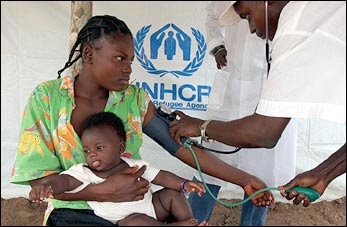
A returnee mother and her baby get a health screening at a transfer centre in Monzombo, DRC.
After the boat ride to a way station in DRC, the refugees are given a three-month supply of food, plastic sheeting, sleeping mats and jerry cans, and then driven right to their home villages the same day. Ironically, the rains that give a boost to the boats often turn the roads into quagmires for the trucks. Drivers carry chainsaws to dispatch the huge trees that frequently fall across the muddy tracks.
After their return home - where relatives and neighbours have been alerted to expect them - the former refugees are monitored by UNHCR to make sure they have adequate shelter and are settling in well. As a boost to rebuilding their lives at home, UNHCR and its partners run programmes to teach skills to help women earn money.
Jeanette Malami, a 25-year-old mother of three, is busily making a small turquoise, white and red carpet in one such centre in Libenge, just across the river in DRC. She came home to find her home destroyed, but still says, "After fleeing (five years ago), to come home to be back in our country is a big joy."
Back at the landing in Betou, seeing off fellow refugees, Victor Benga-Tongovi, head of the DRC Refugees Committee, isn't fazed by the idea of treating the Oubangui River as a highway. "In the old days we used to go all the way to [DRC capital] Kinshasa on the river," he says - a journey of five or more days.
No, he says, the significance of this boat convoy lies elsewhere: "The real reason the repatriation is something special for us is because it lets us go home."
By Kitty McKinsey





